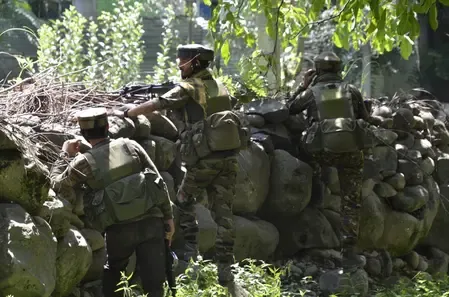Did Pakistan's Cyber Attack on Indian Army Sites Fail Spectacularly?

Synopsis
Key Takeaways
- Pakistan resorted to cyber attacks after failing on the battlefield.
- Indian Army successfully thwarted these attempts due to robust cybersecurity measures.
- The ongoing conflict reflects a pattern of state-sponsored aggression.
- India remains committed to maintaining restraint despite provocations.
- International support highlights the need for diplomatic resolutions.
New Delhi, April 30 (NationPress) Following a failed ground offensive by the Pakistani Army due to their breach of the Ceasefire Agreement on April 29 along the International Border in the Pargwal Sector of Jammu, the neighboring army has shifted tactics to cyber attacks against India.
“The breach of the ceasefire aligns with a troubling trend of heightened unprovoked assaults and infiltration efforts along the Line of Control (LoC), to which the Indian Army has reacted vehemently. After failing on the battlefield, Pakistan has resorted to cyber warfare,” disclosed senior defense sources to IANS.
Sources indicate that in the last week, Pakistani cyber operatives have targeted various Indian military-associated websites, including the Army Nursing College, Army Public Schools, Army Welfare Housing Organisation, and others.
“Pakistan has completely failed to compromise critical Indian Army cyber systems due to our robust security protocols. Their attempts to attack platforms serving women, children, and veterans highlight the moral decline within Pakistan’s strategic planning,” the source stated.
The source elaborated that this mix of terrorism, border hostility, and cyber offensives illustrates a larger pattern of state-sponsored aggression.
On the subject of ceasefire breaches, it was noted that Pakistani forces have contravened the ceasefire agreement 15 times in addition to 2651 instances of minor arms fire in 2025.
“Pakistan facilitated three infiltration attempts resulting in the deaths of seven terrorists. We have responded to these provocations decisively while upholding our commitment to restraint,” the sources remarked.
Two flag meetings between Indian and Pakistani military officials at Poonch have also taken place regarding the ceasefire violations.
“These meetings were initiated by India to urge the Pakistani Army to refrain from infiltration attempts and ceasefire violations. The Indian side has also communicated its warnings during the weekly hotline discussions between the two DGMOs every Tuesday,” the sources added.
Regarding the Pahalgam attack, defense sources noted that Pakistan attempted to portray the incident as a “false flag” operation by India.
“Pakistan’s narrative crumbled under the weight of evidence when their own Defense Minister, Khawaja Asif, acknowledged in an interview with a British news outlet on April 26 that Pakistan has been supporting terrorists for over 30 years,” they stated.
Tensions between the two neighboring nations escalated following the terror attack in Pahalgam that claimed the lives of over 20 civilians, primarily tourists, on April 22.
The Resistance Front (TRF), a splinter group of Lashkar-e-Taiba (LeT), has asserted responsibility for the attack.
Prime Minister Narendra Modi had to shorten his visit to Saudi Arabia in light of the terror attack, vowing to hold the perpetrators accountable.
On April 16, Pakistan’s Chief of Army Staff, General Asim Munir, delivered a confrontational speech to a gathering of overseas Pakistanis in Islamabad, which was followed by an anti-India diatribe from a Lashkar-e-Taiba (LeT) leader in Khaigala, Rawalkot (PoK) on April 18.
Defense sources remarked that despite worldwide condemnation of the Pahalgam attack, India’s patience is being tested, yet the nation has shown restraint thus far.
“This restraint should not be misconstrued as weakness,” they emphasized.
The sources concluded that Pakistan’s duplicity is now evident to the international community.
“As we consider our next moves, we do so from a position of strength, supported by truth, international backing, and a steadfast resolve to safeguard our populace,” the source declared.










